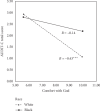Predictors of Alcohol Use in Safety-Net Primary Care: Classism, Religiosity, and Race
- PMID: 32612865
- PMCID: PMC7317315
- DOI: 10.1155/2020/5916318
Predictors of Alcohol Use in Safety-Net Primary Care: Classism, Religiosity, and Race
Abstract
Class-based discrimination may impact problematic drinking in low-income populations, which may be buffered by personal religiosity. However, little is known how race may impact this association. The purpose of this study was to examine racial differences in the effect of class-based discrimination on problematic drinking as moderated by comfort with God and determine if there were conditional direct effects of class-based discrimination on problematic drinking by race. In this cross-sectional study, participants (N = 189) were patients of an urban, safety-net primary care clinic who completed questionnaires assessing experiences of class-based discrimination, attitudes toward God, and alcohol use. Data were collected from 2015 to 2016 and analyzed using the Hayes PROCESS macro. There was a significant main effect for class-based discrimination predicting problematic drinking. Two-way interaction analyses identified a significant comfort with God by race interaction with greater comfort with God associated with less problematic drinking among white but not black respondents. Conditional direct effects showed that experiences of class-based discrimination were associated with problematic drinking at low and moderate but not high levels of comfort with God in black participants, whereas none were observed for white participants. This study provides insight on how personal religiosity, class-based discrimination, and race may intertwine to shape problematic alcohol use in primarily low-income, urban patients. Clinicians' awareness of risk and protective factors, as well as how race tempers the effects of such factors, is vital in providing better care for this population.
Copyright © 2020 Michael A. Trujillo et al.
Conflict of interest statement
The authors declare no conflicts of interest.
Figures


References
Grants and funding
LinkOut - more resources
Full Text Sources

